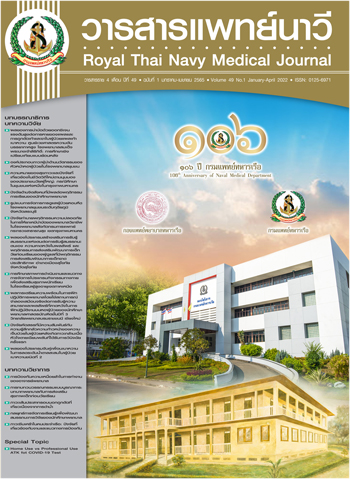The Effect of a Perceived Self-Efficacy Promoting Program on Perceived Self-Efficacy, Outcome Expectations, and Preschool Child Development Promotion Behavior in Caregivers with Ineffective Development Promotion Behavior in Mueang Sukhothai District, Sukh
Main Article Content
Abstract
This quasi-experimental research aimed to study the effects of self-efficacy enhancement on perceived self-efficacy, outcome expectations, and preschool children development promotion behavior among caregivers with ineffective development promotion behavior. The sample consisted of 70 caregivers of preschool children in Mueang Sukhothai district, Sukhothai province. The sample were assigned into experimental group and control group by simple random sampling. There were 35 caregivers in each group. Caregivers in experimental group was carried out for 10 weeks with a follow-up at week 14. A conventional caring program was used with the control group. Research instruments consisted of the perceived self-efficacy promoting program, questionnaires on personal information, perceived self-efficacy, outcome expectations, and child development promotion behavior. Data were analyzed by percentage, mean, standard deviation, repeated measures ANOVA, and repeated measures ANCOVA.
The findings showed that at post-experimental and follow-up periods, the experimental group had higher mean scores of perceived self-efficacy, outcome expectations and child development promotion behavior than scores at a pre-experimental period with a statistical significance level of (F = 193.15, p < .001; F = 34.74, p < .001; F = 132.83, p < .001, respectively).
The experimental group had a significantly higher mean scores of perceived self-efficacy, outcome expectations, and child development promotion behavior than the control group with a statistical significance level of (F = 195.46, p < .001; F = 54.35, p < .001; F = 101.35, p < .001, respectively). From the result of the study, it was concluded that this program enhances child caregivers’ behavior for promoting child development. Therefore, health officials should apply the program to further develop caregivers' perceived self-efficacy in other ages of children.
Article Details

This work is licensed under a Creative Commons Attribution-NonCommercial-NoDerivatives 4.0 International License.
References
Ministry of Public Health, Department of Health. Development of children aged 2 - 5 years: handbook of medical and public health personnel promoting development of children ranged from newborns - 5 years. Bangkok: Printing House of the War Veterans Organization of Thailand; 2010. (in Thai).
Kaewlee P. Factors related to childhood development in Ubon Ratchathani Municipality. In: The 1st National Academic Conference and Research Presentation (RTUNC): strengthening interdisciplinary, integrating Thai culture towards AC; 2016 July 29; Ubon Ratchathani. Ratchathani University; 2016. p. 1675-85. (in Thai).
Phattanaphongthon J. Management of well child clinic. In: Phattanaphongthon J, Thonghem A, editors. Early childhood development promotion guide for hospital intensive course. Bangkok: Office of National Buddhism Press; 2015. p. 43. (in Thai).
Koonrungsesomboon K. Quality of life of parents of children with delayed development. Journal of Suan Prung 2012;28(1):5-16. (in Thai).
Toomoy C. Factors affecting the developmental promotion behaviors among primary caregivers of toddlers in a well-child clinic, Umphang Hospitai, Umphang District, Tak Province. [Master's Thesis, Faculty of Public Health]. Naresuan University; 2018. (in Thai).
Mahidol University, Institute for Population and Social Research. Thai health 2018: Buddhism and well-being promotion. Nakhon Pathom: Institute for Population and Social Research; 2018. p. 472. (in Thai).
World Health Organization. Developmental in early childhood: prevention, early iidentification, assessment and intervention in low-and middle income countries: a review. Turkey: Turkey Country Office and CEECIS Regional Office; 2012.
Phattanaphongthon J, editors. The 6th of factors effecting to child development in Thailand in 2017. [Internet]. Nonthabur: Bureau of Health Promotion, Department of Health; 2018. [cited 2019 December 23]. Available from: http://cgtoolbook.com/books003/2/. (in Thai).
Ban Wang Takhro Health Promoting Hospital. Annual report 2018: Maternal and Child Health Division, Ban Wang Takhro Health Promoting Hospital. Sukhothai: Ban Wang Takhro Health Promoting Hospital; 2018. (in Thai).
Sukhothai Provincial Health Office. HDC Dashbord of Sukhothai Provincial Health Office. [Internet]. [cited 2018 October 26]. Available from: https://sti.hdc.moph.go.th/hdc/main/index.php. (in Thai).
National Institute of Child Health. Annual Report 2017: National Institute of Child Health, Department of Health, Ministry of Public Health. Bangkok: Samcharoen Phanich (Bangkok); 2017. (in Thai).
Prasith-thimet T. Thai early child development in regional health service 4. Journal of Preventive Medicine Association of Thailand 2015;5(2):173-97. (in Thai).
Ministry of Public Health. Developmental surveillance and promotion manual. Bangkok: Printing House of the War Veterans Organization of Thailand; 2018. (in Thai).
UNICEF Thailand. Survey of the situation of children and women in Thailand 2015-2016. [Internet]. Bangkok: UNICEF Thailand; 2016. [cited 2018 September 20]. Available from: https://www.unicef.org/thailand/media/181/file/การสำรวจสถานการณ์เด็กและสตรีในประเทศไทย%20พ.ศ.%202015-2016%20-%20ผลสำรวจที่สำคัญ.pdf. (in Thai).
Losateankit P. 80% of Thai people raise their children through IT media. [Internet]. Bangkok: Thai Health Promotion Foundation; 2017. [cited 2018 September 23]. Available from: https://www.thaihealth.or.th/Content/38539 -คนไทย%2080%20เลี้ยงลูกด้วยสื่อไอที.html. (in Thai).
Bandura A. Self-efficacy: the exercise of control. New York: W.H. Freeman and Company; 1997.
Thongluang P. The effect of self-efficacy developing program on promoting early childhood development. [Master's Thesis, Faculty of Nursing]. Naresuan University; 2016. (in Thai).
Coleman PK, Karraker KH. Self-efficacy and parenting quality: findings and future applications. Development Review 1998;18(1):47-85.
Thisara P, Ponmark J, Sikhao P, Silapavitayatorn B. Predictive factors of parental behaviors on promoting early childhood development in Phayao province. Journal of Nursing and Health Care 2017;35(2):169-76. (in Thai).
Apiramanon L. Effectiveness of behavioral change program for infant development among caregivers in Health Promotion Center Region 3 Nakhon Sawan. [Master's Thesis, Faculty of Public Health]. Naresuan University; 2019. (in Thai).
Best JW. Research in education. New Jersey: Prentice-Hall; 1981.
Kispredarborisuthi B. Statistical analysis for research. 5th ed. Bangkok: Ruenkaew Printing; 2010. (in Thai).
Butchan P, Jamusri S, Singhala K. Effects of breastfeeding promoting program on family members self-efficacy and breastfeeding promotion behavior in community. Journal of Nursing and Health Care 2016;34(4):97-105. (in Thai).
Roonmai J, Insuea A, Thongsupan A, Tanprapha S, Yaemsuda T. The Effect of using multimedia tools on knowledge and maternal behaviors in caring for toddlers with pneumonia in pediatric ward of Somdech Phra Pinklao Hospital. Royal Thai Navy Medical Journal 2015;42(2):29-42. (in Thai).
Taraka P, Chaisawan K, Yaemsuda T. The Effects of perceived self-efficacy promoting program on health promoting behavior of primigravida adolescents . Royal Thai Navy Medical Journal 2019;46(2):319-35. (in Thai).

